ANAT 2700
University Of Toledo
All 11 results
Sort by
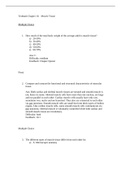
-
Testbank Chapter 10. Muscle Tissue Multiple Choice
- Exam (elaborations) • 41 pages • 2022
-
 greatsolutions
greatsolutions
-
- $11.49
- + learn more
1. How much of the total body weight of the average adult is muscle tissue? a) 20-30% b) 30-40% c) 40-50% d) 50-60% e) 60-70% Ans: C Difficulty: medium Feedback: Chapter Opener Essay 2. Compare and contrast the functional and structural characteristics of muscular tissue. Ans: Both cardiac and skeletal muscle tissues are striated and smooth muscle is not, hence its name. Skeletal muscle cells have more than one nucleus, are large and run parallel to each other. Cardiac muscle cells usually have ...
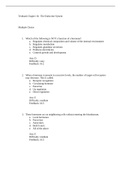
-
Testbank Chapter 18. The Endocrine System
- Exam (elaborations) • 22 pages • 2022
-
 greatsolutions
greatsolutions
-
- $14.49
- + learn more
Multiple Choice 1. Which of the following is NOT a function of a hormone? a. Regulates chemical composition and volume of the internal environment b. Regulates metabolism c. Regulates glandular secretions d. Produces electrolytes e. Controls growth and development Ans: D Difficulty: easy Feedback: 18.2 2. When a hormone is present in excessive levels, the number of target-cell receptors may decrease. This is called: a. Receptor recognition b. Circulating hormone c. Paracrine d. Up regulation e. ...
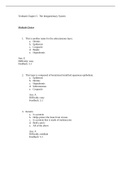
-
Testbank Chapter 5. The Integumentary System
- Exam (elaborations) • 27 pages • 2022
-
 greatsolutions
greatsolutions
-
- $8.49
- + learn more
1. This is another name for the subcutaneous layer. a. Dermis b. Epidermis c. Corpuscle d. Basale e. Hypodermis Ans: E Difficulty: easy Feedback: 5.1 2. This layer is composed of keratinized stratified squamous epithelium. a. Epidermis b. Dermis c. Hypodermis d. Subcutaneous e. Corpuscle Ans: A Difficulty: easy Feedback: 5.1 3. Keratin a. Is a protein b. Helps protect the bone from viruses c. Is a protein that is made of melanocytes d. Both a and c e. All of the above Ans...
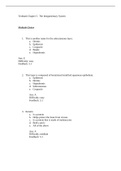
-
Testbank Chapter 5. The Integumentary System
- Exam (elaborations) • 27 pages • 2022
-
 Havilah
Havilah
-
- $8.49
- + learn more
1. This is another name for the subcutaneous layer. a. Dermis b. Epidermis c. Corpuscle d. Basale e. Hypodermis Ans: E Difficulty: easy Feedback: 5.1 2. This layer is composed of keratinized stratified squamous epithelium. a. Epidermis b. Dermis c. Hypodermis d. Subcutaneous e. Corpuscle Ans: A Difficulty: easy Feedback: 5.1 3. Keratin a. Is a protein b. Helps protect the bone from viruses c. Is a protein that is made of melanocytes d. Both a and c e. All of the above Ans...
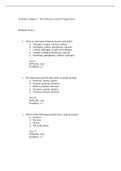
-
Testbank Chapter 2. The Chemical Level of Organization
- Exam (elaborations) • 25 pages • 2022
-
 Havilah
Havilah
-
- $9.99
- + learn more
1. What are the major elements found in the body? a. Nitrogen, oxygen, calcium, sodium b. Hydrogen, carbon, phosphorus, calcium c. Carbon, hydrogen, oxygen and nitrogen d. Oxygen, nitrogen, potassium, calcium e. Potassium, phosphorus, sodium, hydrogen Ans: C Difficulty: easy Feedback: 2.1 2. The subatomic particles that make up atoms include: a. Neutrons, quarks, muons b. Protons, neutrons, electrons c. Muons, positons, neutrons d. Electrons, quarks, protons e. Positons, protons, n...

-
Tortora and Derrickson Principles of Anatomy & Physiology, 12th edition Ch12: Nervous Tissue
- Exam (elaborations) • 17 pages • 2022
-
 Havilah
Havilah
-
- $13.49
- + learn more
. Which of the following is not a function of the nervous system? a. Sensory function b. Integrative function c. Motor function d. All are functions of the nervous system Ans: D Level: easy Link: 12.1 2. The peripheral nervous system can be divided into: a. Somatic nervous system b. Autonomic nervous system c. Enteric nervous system d. All of the above Ans: D Level: easy Link: 12.3 3. The motor portion of the autonomic nervous system can be divided into: a. Sympathetic division ...
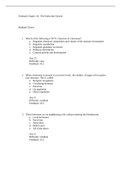
-
Testbank Chapter 18. The Endocrine System
- Exam (elaborations) • 22 pages • 2022
-
 Havilah
Havilah
-
- $14.49
- + learn more
Multiple Choice 1. Which of the following is NOT a function of a hormone? a. Regulates chemical composition and volume of the internal environment b. Regulates metabolism c. Regulates glandular secretions d. Produces electrolytes e. Controls growth and development Ans: D Difficulty: easy Feedback: 18.2 2. When a hormone is present in excessive levels, the number of target-cell receptors may decrease. This is called: a. Receptor recognition b. Circulating hormone c. Paracrine d. Up...
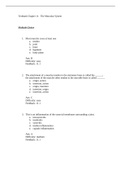
-
Testbank Chapter 11. The Muscular System
- Exam (elaborations) • 36 pages • 2022
-
 Havilah
Havilah
-
- $11.49
- + learn more
. Most muscles cross at least one a. tendon b. joint c. bone d. ligament e. body plane Ans: B Difficulty: easy Feedback: 11.1 2. The attachment of a muscles tendon to the stationary bone is called the ______; the attachment of the muscles other tendon to the movable bone is called ______. a. origin, action b. insertion, action c. origin, insertion d. insertion, origin e. insertion, action Ans: C Difficulty: easy Feedback: 11.1 3. This is an inflammation of the synovial membran...
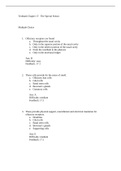
-
Testbank Chapter 17. The Special Senses
- Exam (elaborations) • 34 pages • 2022
-
 Havilah
Havilah
-
- $9.99
- + learn more
Testbank Chapter 17. The Special Senses Multiple Choice 1. Olfactory receptors are found a. Throughout the nasal cavity b. Only in the superior portion of the nasal cavity c. Only in the inferior portion of the nasal cavity d. From the vestibule to the pharynx e. Only in the mid-nasal ridges Ans: B Difficulty: easy Feedback: 17.1 2. These cells provide for the sense of smell. a. Olfactory hair cells b. Glial cells c. Basal stem cells d. Bowman’s glands e. Gustatory cells Ans: ...
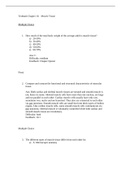
-
Testbank Chapter 10. Muscle Tissue Multiple Choice
- Exam (elaborations) • 41 pages • 2022
-
 Havilah
Havilah
-
- $11.49
- + learn more
1. How much of the total body weight of the average adult is muscle tissue? a) 20-30% b) 30-40% c) 40-50% d) 50-60% e) 60-70% Ans: C Difficulty: medium Feedback: Chapter Opener Essay 2. Compare and contrast the functional and structural characteristics of muscular tissue. Ans: Both cardiac and skeletal muscle tissues are striated and smooth muscle is not, hence its name. Skeletal muscle cells have more than one nucleus, are large and run parallel to each other. Cardiac muscle cells...

How much did you already spend on Stuvia? Imagine there are plenty more of you out there paying for study notes, but this time YOU are the seller. Ka-ching! Discover all about earning on Stuvia


